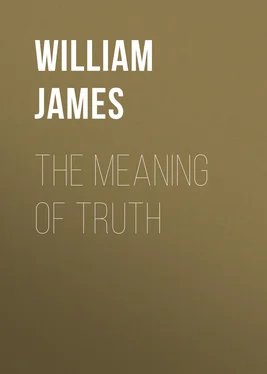William James - The Meaning of Truth
Здесь есть возможность читать онлайн «William James - The Meaning of Truth» — ознакомительный отрывок электронной книги совершенно бесплатно, а после прочтения отрывка купить полную версию. В некоторых случаях можно слушать аудио, скачать через торрент в формате fb2 и присутствует краткое содержание. Жанр: foreign_antique, Философия, foreign_edu, на английском языке. Описание произведения, (предисловие) а так же отзывы посетителей доступны на портале библиотеки ЛибКат.
- Название:The Meaning of Truth
- Автор:
- Жанр:
- Год:неизвестен
- ISBN:нет данных
- Рейтинг книги:3 / 5. Голосов: 1
-
Избранное:Добавить в избранное
- Отзывы:
-
Ваша оценка:
- 60
- 1
- 2
- 3
- 4
- 5
The Meaning of Truth: краткое содержание, описание и аннотация
Предлагаем к чтению аннотацию, описание, краткое содержание или предисловие (зависит от того, что написал сам автор книги «The Meaning of Truth»). Если вы не нашли необходимую информацию о книге — напишите в комментариях, мы постараемся отыскать её.
The Meaning of Truth — читать онлайн ознакомительный отрывок
Ниже представлен текст книги, разбитый по страницам. Система сохранения места последней прочитанной страницы, позволяет с удобством читать онлайн бесплатно книгу «The Meaning of Truth», без необходимости каждый раз заново искать на чём Вы остановились. Поставьте закладку, и сможете в любой момент перейти на страницу, на которой закончили чтение.
Интервал:
Закладка:
Let us say no more then about this objection, but enlarge our thesis, thus: If there be in the universe a Q other than the Q in the feeling, the latter may have acquaintance with an entity ejective to itself; an acquaintance moreover, which, as mere acquaintance, it would be hard to imagine susceptible either of improvement or increase, being in its way complete; and which would oblige us (so long as we refuse not to call acquaintance knowledge) to say not only that the feeling is cognitive, but that all qualities of feeling, SO LONG AS THERE IS ANYTHING OUTSIDE OF THEM WHICH THEY RESEMBLE, are feelings OF qualities of existence, and perceptions of outward fact.
The point of this vindication of the cognitive function of the first feeling lies, it will be noticed, in the discovery that q does exist elsewhere than in it. In case this discovery were not made, we could not be sure the feeling was cognitive; and in case there were nothing outside to be discovered, we should have to call the feeling a dream. But the feeling itself cannot make the discovery. Its own q is the only q it grasps; and its own nature is not a particle altered by having the self-transcendent function of cognition either added to it or taken away. The function is accidental; synthetic, not analytic; and falls outside and not inside its being. [Footnote: It seems odd to call so important a function accidental, but I do not see how we can mend the matter. Just as, if we start with the reality and ask how it may come to be known, we can only reply by invoking a feeling which shall RECONSTRUCT it in its own more private fashion; so, if we start with the feeling and ask how it may come to know, we can only reply by invoking a reality which shall RECONSTRUCT it in its own more public fashion. In either case, however, the datum we start with remains just what it was. One may easily get lost in verbal mysteries about the difference between quality of feeling and feeling of quality, between receiving and reconstructing the knowledge of a reality. But at the end we must confess that the notion of real cognition involves an unmediated dualism of the knower and the known. See Bowne's Metaphysics, New York, 1882, pp. 403-412, and various passages in Lotze, e.g., Logic, Sec. 308. ['Unmediated' is a bad word to have used.—1909.]]
A feeling feels as a gun shoots. If there be nothing to be felt or hit, they discharge themselves ins blaue hinein. If, however, something starts up opposite them, they no longer simply shoot or feel, they hit and know.
But with this arises a worse objection than any yet made. We the critics look on and see a real q and a feeling of q; and because the two resemble each other, we say the one knows the other. But what right have we to say this until we know that the feeling of q means to stand for or represent just that SAME other q? Suppose, instead of one q, a number of real q's in the field. If the gun shoots and hits, we can easily see which one of them it hits. But how can we distinguish which one the feeling knows? It knows the one it stands for. But which one DOES it stand for? It declares no intention in this respect. It merely resembles; it resembles all indifferently; and resembling, per se, is not necessarily representing or standing-for at all. Eggs resemble each other, but do not on that account represent, stand for, or know each other. And if you say this is because neither of them is a FEELING, then imagine the world to consist of nothing but toothaches, which ARE feelings, feelings resembling each other exactly,—would they know each other the better for all that?
The case of q being a bare quality like that of toothache-pain is quite different from that of its being a concrete individual thing. There is practically no test for deciding whether the feeling of a bare quality means to represent it or not. It can DO nothing to the quality beyond resembling it, simply because an abstract quality is a thing to which nothing can be done. Being without context or environment or principium individuationis, a quiddity with no haecceity, a platonic idea, even duplicate editions of such a quality (were they possible), would be indiscernible, and no sign could be given, no result altered, whether the feeling I meant to stand for this edition or for that, or whether it simply resembled the quality without meaning to stand for it at all.
If now we grant a genuine pluralism of editions to the quality q, by assigning to each a CONTEXT which shall distinguish it from its mates, we may proceed to explain which edition of it the feeling knows, by extending our principle of resemblance to the context too, and saying the feeling knows the particular q whose context it most exactly duplicates. But here again the theoretic doubt recurs: duplication and coincidence, are they knowledge? The gun shows which q it points to and hits, by BREAKING it. Until the feeling can show us which q it points to and knows, by some equally flagrant token, why are we not free to deny that it either points to or knows any one of the REAL q's at all, and to affirm that the word 'resemblance' exhaustively describes its relation to the reality?
Well, as a matter of fact, every actual feeling DOES show us, quite as flagrantly as the gun, which q it points to; and practically in concrete cases the matter is decided by an element we have hitherto left out. Let us pass from abstractions to possible instances, and ask our obliging deus ex machina to frame for us a richer world. Let him send me, for example, a dream of the death of a certain man, and let him simultaneously cause the man to die. How would our practical instinct spontaneously decide whether this were a case of cognition of the reality, or only a sort of marvellous coincidence of a resembling reality with my dream? Just such puzzling cases as this are what the 'society for psychical research' is busily collecting and trying to interpret in the most reasonable way.
If my dream were the only one of the kind I ever had in my life, if the context of the death in the dream differed in many particulars from the real death's context, and if my dream led me to no action about the death, unquestionably we should all call it a strange coincidence, and naught besides. But if the death in the dream had a long context, agreeing point for point with every feature that attended the real death; if I were constantly having such dreams, all equally perfect, and if on awaking I had a habit of ACTING immediately as if they were true and so getting 'the start' of my more tardily instructed neighbors,—we should in all probability have to admit that I had some mysterious kind of clairvoyant power, that my dreams in an inscrutable way meant just those realities they figured, and that the word 'coincidence' failed to touch the root of the matter. And whatever doubts any one preserved would completely vanish, if it should appear that from the midst of my dream I had the power of INTERFERING with the course of the reality, and making the events in it turn this way or that, according as I dreamed they should. Then at least it would be certain that my waking critics and my dreaming self were dealing with the SAME.
And thus do men invariably decide such a question. THE FALLING OF THE DREAM'S PRACTICAL CONSEQUENCES into the real world, and the EXTENT of the resemblance between the two worlds are the criteria they instinctively use. [Footnote: The thoroughgoing objector might, it is true, still return to the charge, and, granting a dream which should completely mirror the real universe, and all the actions dreamed in which should be instantly matched by duplicate actions in this universe, still insist that this is nothing more than harmony, and that it is as far as ever from being made clear whether the dream-world refers to that other world, all of whose details it so closely copies. This objection leads deep into metaphysics. I do not impugn its importance, and justice obliges me to say that but for the teachings of my colleague, Dr. Josiah Royce, I should neither have grasped its full force nor made my own practical and psychological point of view as clear to myself as it is. On this occasion I prefer to stick steadfastly to that point of view; but I hope that Dr. Royce's more fundamental criticism of the function of cognition may ere long see the light. [I referred in this note to Royce's religious aspect of philosophy, then about to be published. This powerful book maintained that the notion of REFERRING involved that of an inclusive mind that shall own both the real q and the mental q, and use the latter expressly as a representative symbol of the former. At the time I could not refute this transcendentalist opinion. Later, largely through the influence of Professor D. S. Miller (see his essay 'The meaning of truth and error,' in the Philosophical Review for 1893, vol. 2 p. 403) I came to see that any definitely experienceable workings would serve as intermediaries quite as well as the absolute mind's intentions would.]] All feeling is for the sake of action, all feeling results in action,—to-day no argument is needed to prove these truths. But by a most singular disposition of nature which we may conceive to have been different, MY FEELINGS ACT UPON THE REALITIES WITHIN MY CRITIC'S WORLD. Unless, then, my critic can prove that my feeling does not 'point to' those realities which it acts upon, how can he continue to doubt that he and I are alike cognizant of one and the same real world? If the action is performed in one world, that must be the world the feeling intends; if in another world, THAT is the world the feeling has in mind. If your feeling bear no fruits in my world, I call it utterly detached from my world; I call it a solipsism, and call its world a dream-world. If your toothache do not prompt you to ACT as if I had a toothache, nor even as if I had a separate existence; if you neither say to me, 'I know now how you must suffer!' nor tell me of a remedy, I deny that your feeling, however it may resemble mine, is really cognizant of mine. It gives no SIGN of being cognizant, and such a sign is absolutely necessary to my admission that it is.
Читать дальшеИнтервал:
Закладка:
Похожие книги на «The Meaning of Truth»
Представляем Вашему вниманию похожие книги на «The Meaning of Truth» списком для выбора. Мы отобрали схожую по названию и смыслу литературу в надежде предоставить читателям больше вариантов отыскать новые, интересные, ещё непрочитанные произведения.
Обсуждение, отзывы о книге «The Meaning of Truth» и просто собственные мнения читателей. Оставьте ваши комментарии, напишите, что Вы думаете о произведении, его смысле или главных героях. Укажите что конкретно понравилось, а что нет, и почему Вы так считаете.












